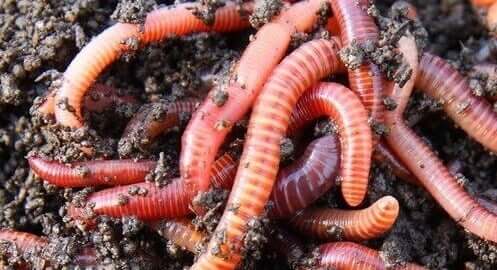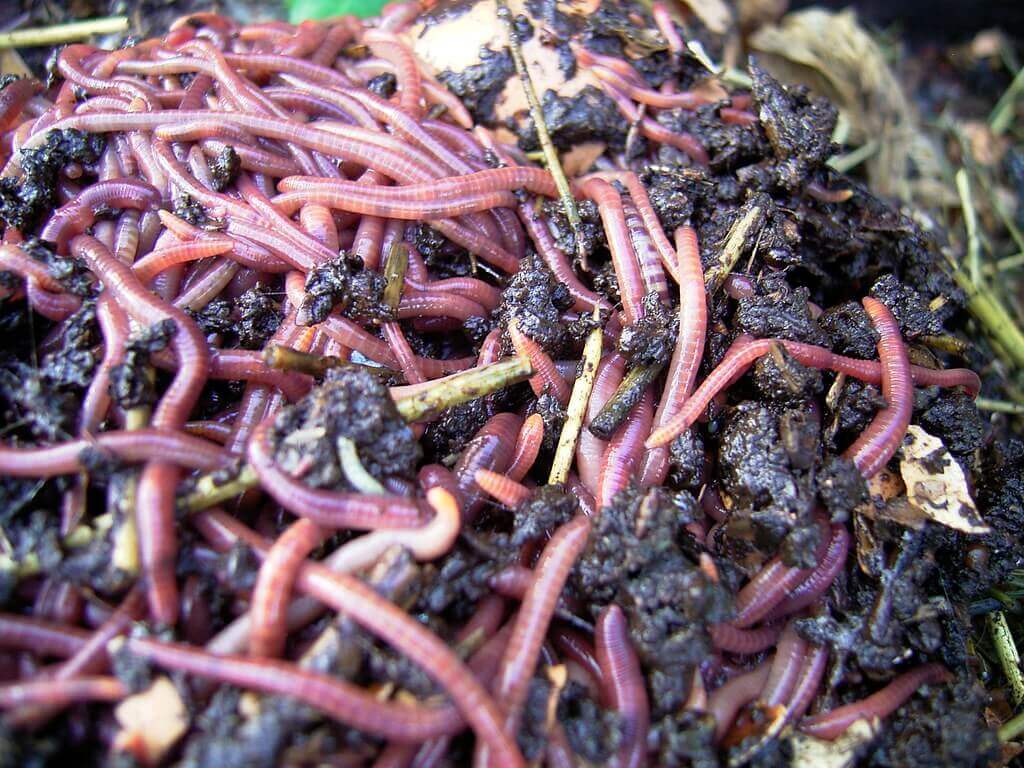What is a Worm Farm?
Embracing Nature’s Recyclers in Your Garden
A worm farm, or an earthworm farm, is a compact ecosystem where red wiggler worms transform organic waste into a treasure trove of nutrients. Think of it as nature’s way of recycling, turning your kitchen scraps into black gold for your garden! Worm farms are more than just compost bins; they are a testament to the wonders of nature’s recycling abilities. Not only do they produce excellent compost for your garden, but they also serve as a fascinating educational tool, showcasing the lifecycle and the environmental benefits of worms.
Best Worms for Your Farm
Meet the Superstars – Red Wiggler Worms
In the realm of worm composting, the red wiggler worms are the unsung heroes. Adaptable and efficient, these worms thrive in South African climates, making them the top choice for your worm farm kit. Red wigglers are known for their ability to consume and process large amounts of organic matter. Their vigorous appetite and rapid reproduction rate make them an ideal choice for effective composting, ensuring your worm farm is always active and productive.

Feeding Your Worm Farm
A Gourmet Diet for Your Red Wigglers
Master the art of feeding your worm farm! From fruit and vegetable scraps to coffee grounds, we’ll guide you through the dos and don’ts to keep your red wigglers happy and productive. Proper feeding is key to maintaining a healthy worm farm. By understanding the dietary preferences of your red wigglers, you can ensure that they not only survive but thrive, providing you with richer and more nutritious compost for your garden.
Building Your Own Worm Farm
DIY Magic – Creating Your Earthworm Sanctuary
Ready to get your hands dirty? Building an earthworm farm is easier than you think! Follow our step-by-step guide to construct a thriving home for your worms, using simple materials and a sprinkle of creativity. Constructing your worm farm is a rewarding experience that allows for customization and creativity. Whether you choose to build it from scratch or modify existing structures, the key is to create a comfortable habitat for your worms that also suits your space and style.
Here is our Step-by-Step Guide on How to Build a Worm Farm:
Click Here for How to Build a Worm Farm
Purchasing Worm Farms
Where to Find the Best Worm Farm Kits in South Africa
For those preferring a ready-to-go solution, we’ve got you covered. Discover the best places to purchase worm farm kits in South Africa, complete with red wiggler worms for sale. Finding the right worm farm kit is crucial for beginners. It’s essential to choose kits that are easy to maintain and suitable for your specific gardening needs.
Where to Worm FArms and Red Wiggler Worms in South Africa?
The Benefits of Having a Worm Farm
Why Worm Composting is a Game-Changer
Worm composting isn’t just about creating rich soil; it’s about embracing a sustainable lifestyle. Learn how having a worm farm can significantly reduce household waste and contribute positively to our environment. Aside from the environmental benefits, worm composting is a deeply satisfying activity. It connects you with the cycle of nature and gives a sense of accomplishment as you watch your kitchen scraps transform into valuable resources for your garden.
Reduce waste by having a worm farm.
The fact of the matter is that most of the waste we throw into rubbish bins end up in one of our strained landfill sites. A more sustainable and environmentally-friendly option would be to consider getting a WORM FARM. It is so easy to operate and inexpensive!
Worm farms are very beneficial for the environment in that the waste that would usually end up in a landfill site is broken down into compost for the garden. The worms are natural recyclers consuming the food as bacteria breaks it down. The worms continue the process in their gut which contains even more bacteria. The resulting casts contain all the nutrients for plant growth as well as plant growth hormones.
A worm farm will give you Worm Wee(Vermileachate) and Vermicompost both, excellent for pot plants and gardens.
Also, ease your conscience by actively doing something for the environment.
Garden & Kitchen waste deposited at Landfill Sites adds to Global Warming & Pollutes the Environment.
Garden & Kitchen waste deposited at landfill sites are an enormous source of pollution to the environment. The two main problems with this waste deposited in Landfills are leachate and greenhouse gases. The waste rots and decomposes and produces acidic chemicals which combine with liquids in the waste to form leachate (pollutes the water and soil) and harmful gases (CO2 and Methane), both of which are greenhouse gases and contribute to global warming.
Worm Farm Q&A
Frequently asked questions and awnsers about worm farms:
How often do you feed worm farms?
Feed worm farms every week or two, depending on the number of worms and the rate at which they consume the scraps. It’s important not to overfeed, as excess food can rot and attract pests.
How fast do worms multiply?
Worms multiply quickly under ideal conditions. In about 60 days, the population can double, provided they have enough food, moisture, and space.
How long can worms go without food?
Worms can survive up to 2 weeks without food. However, it’s best to maintain a regular feeding schedule for a healthy worm farm.
Can you put bread in worm farm?
Bread can be put in a worm farm, but in moderation. It should be moistened and buried deep in the compost to prevent mold and pest infestation.
How do you make worms eat faster?
To make worms eat faster, chop or blend the food scraps into smaller pieces, maintain optimal moisture levels, and ensure the farm has a balanced pH.
Where is the best place to put a worm farm?
The best place for a worm farm is in a cool, shaded area, such as a garage or balcony, where temperatures are consistent and there’s protection from extreme weather.
Can worms eat banana peels?
Yes, worms can eat banana peels, but they should be chopped into smaller pieces for easier consumption.
What to avoid in a worm farm?
Avoid adding meat, dairy, oily foods, citrus, and spicy scraps to a worm farm. These items can create odors, attract pests, and harm the worms.
What should I not put in my worm farm?
Do not put inorganic materials, chemicals, plastic, or non-biodegradable items in your worm farm.
What do worms hate the most?
Worms dislike extreme temperatures, excessive light, acidic environments, and foods like citrus and onions.
Is rice OK for worm farm?
Cooked rice is okay for a worm farm in small quantities, but it should be monitored as it can attract pests.
Can you put tea bags in worm farm?
Yes, tea bags can be added to a worm farm, but ensure they are made of biodegradable material.
Can you put egg cartons in worm farm?
Egg cartons, preferably cardboard ones, can be put in a worm farm. They should be torn into smaller pieces for easier breakdown.
Can you put coffee in worm farm?
Yes, coffee grounds are beneficial for worm farms, but should be balanced with other food types to avoid acidity.
Do worms like egg shells?
Worms like eggshells; they should be crushed into fine powder to aid in the worms’ digestion and help maintain the farm’s pH balance.
Do worms like tomatoes?
Worms can eat tomatoes, but in moderation, as the acidity could disturb the balance of the worm farm.
How do you make a healthy worm farm?
Maintain a healthy worm farm by providing a balanced diet, ensuring proper moisture, keeping it at a suitable temperature, and managing the pH level.
What do you feed worms to make them bigger?
Feed worms a balanced diet of vegetable scraps, fruit peels, eggshells, coffee grounds, and occasional starchy foods for growth.
How do I know if my worm bin is working?
A working worm bin will not have foul odors, the worms will be active and multiplying, and the compost will be dark and crumbly.
What are worm farms good for?
Worm farms are excellent for composting kitchen scraps and organic waste into nutrient-rich soil. They help reduce landfill waste, produce natural fertilizer for gardens, and support a sustainable ecosystem.
Join the Worm Farming Revolution
As we wrap up this guide, we invite you to join the growing community of South African gardeners who are turning to worm composting. It’s not just about gardening; it’s about participating in a movement towards a greener, more sustainable future. By embracing worm farming, you’re taking a significant step towards sustainable living. It’s a simple yet powerful way to make a difference, both in your garden and the broader environment. Happy worm farming!
More Resources for Worm Farms:



What is the return for having worm farm?
HI Nhlanhla
The return on having a worm farm can vary depending on several factors, including your goals, the scale of your operation, and how efficiently you manage it. Here are some potential returns or benefits of having a worm farm:
Nutrient-rich compost: Worm farms produce high-quality compost known as vermicompost or worm castings. This organic matter is rich in nutrients and beneficial microorganisms, making it an excellent soil conditioner and fertilizer for your garden or plants. Using worm castings can lead to healthier and more productive plants, which can be particularly beneficial for home gardeners.
Waste reduction: Worm farms can help you reduce food waste by processing kitchen scraps, such as fruit and vegetable peels, coffee grounds, and eggshells. Instead of sending these materials to the landfill, you can convert them into valuable compost with the help of worms. This not only benefits your garden but also contributes to a more sustainable lifestyle.
Cost savings: By producing your own vermicompost, you can reduce the need to purchase commercial fertilizers and soil amendments. Over time, this can result in cost savings for gardeners and landscapers.
Educational opportunities: Worm farming can be a valuable educational tool for children and adults alike. It provides insights into the natural processes of decomposition and the importance of soil health. It can also be an engaging and hands-on way to learn about biology and ecology.
Income generation: Some people choose to scale up their worm farming operations and sell vermicompost, worms, or worm-related products like worm tea (liquid fertilizer produced from worm castings). If managed efficiently and marketed well, a worm farm can generate a modest income.
Environmental benefits: Reducing food waste and improving soil health through vermicomposting can have positive environmental impacts. It helps decrease methane emissions from landfills, conserves landfill space, and promotes sustainable gardening practices.
Hobby and relaxation: For many people, worm farming is a satisfying and enjoyable hobby. Caring for the worms and watching them work can be a relaxing and meditative experience.
It’s important to note that the return on a worm farm may not always be measured solely in monetary terms. While some individuals may profit from selling worm-related products, others may find satisfaction in the environmental benefits, improved soil quality, or the joy of tending to their worms and garden.
The actual return on a worm farm will depend on your specific circumstances, including the amount of organic waste you have available, the space you can dedicate to the farm, and your commitment to managing it effectively. If you’re considering starting a worm farm, it’s a good idea to research and plan carefully to maximize its benefits.
Good Day. I will like to purchase some worms for Compose production for my Farm. Kindly assist
Great article, learning and growing every day
Thank you for this valuable info. I am a full time worm farmer and it is great to see more and more people learning about this amazing natures wonders and apply the knowledge. Good luck to the new peo0le getting involved.
I would like to start a worm farm in my back yard.
Good day, I’m a worm breder how can I get clients .
Hi Michael.
Please contact kyle@plantinfo.co.za
I would like to start my own worm farm
I would like to start my own worm farm. Please assist.
Good day
I would like to start my own worm fam.
I have taken 6 Tyres and started my compost bins.
1. can I take out the compost and mix it with the fresh grass and kitchen scraps.
2. how can I make my farm profitable.
3. I also want to start with any other worms to sell
please advise
Good job, Rina! Upcycling at its full potential! and free black gold.
I had to travel at short notice. I am worried about my worm farm. How long can the survive without attention? There’s plenty of food. I was not able to get a pet sitter.
If your worm farm has plenty of food and is kept in a stable environment, your worms can generally survive for about 3 to 4 weeks without much attention. Worms are quite low-maintenance as long as a few key factors are in place:
Moisture: Make sure the bedding stays moist but not waterlogged before you leave. Worms need moisture to breathe and move, so ensure there’s enough to last for a few weeks.
Temperature: If the temperature is moderate (between 15°C and 25°C), worms will stay comfortable. Extreme heat or cold can be harmful, so ensure your farm is in a temperature-controlled space.
Food: Since you mentioned there’s plenty of food, that’s great! Worms will eat slowly, especially if they’re already well-fed, so it should last a few weeks.
If you’ll be gone for longer than 3-4 weeks, you might want to check for additional solutions, but with these conditions, your worms should be fine for a few weeks!
Hi Im worm farmer I was wondering can I get rid of ant that are already inside my tyres
To get rid of ants inside your worm farm tires without harming your worms, you can use these natural, worm-safe methods:
Diatomaceous Earth (DE): Sprinkle food-grade DE around the base of the tires. DE is harmless to worms but acts as a barrier to ants by dehydrating them.
Cinnamon or Coffee Grounds: Both cinnamon and coffee grounds are natural ant repellents. Sprinkle them around the tire or even inside it where ants are nesting. These substances won’t harm your worms.
Water Barrier: Create a water moat around the tire by placing the worm farm tires in shallow trays of water. Ants can’t cross the water, and it keeps the area around the tires ant-free.
Borax and Sugar Solution: Place a small, contained bait of borax mixed with sugar outside the worm farm (but not near the worms). The ants will carry the borax back to their colony, which will help eliminate them. Be cautious, as borax is toxic to worms, so it should be placed away from the farm.
These methods should help you manage the ants without disturbing your worm farm.